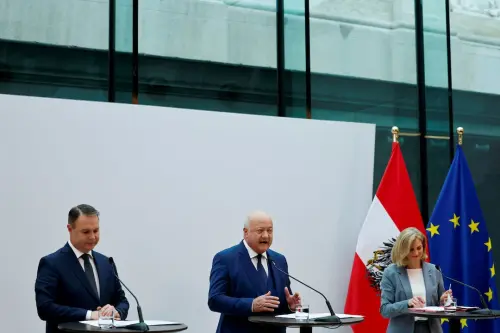Vienna, Feb 27 (Reuters) - Austria's three main centrist parties in parliament have reached a deal to form a government without the far-right Freedom Party, which had emerged victorious in the last election five months ago.
The coalition agreement aims to end Austria's longest government formation period since World War II. The center-right, liberal, and center-left parties have presented a program that includes tax increases for banks and energy companies, budget cuts, and stricter immigration policies.
"We have gone through perhaps the toughest negotiations in our country's history to form a government," stated Christian Stocker, leader of the conservative People's Party (OVP) and likely future chancellor, during a press conference with counterparts from the Social Democrats (SPO) and the liberal Neos party.
The comprehensive 200-page program focuses on bringing the budget deficit within the EU limit of 3% of economic output and reducing greenhouse gas emissions by implementing higher taxes on banks and extending levies on windfall profits from fossil fuel companies. Moreover, it entails reforms in pensions while also tightening immigration rules, including halting family reunification visas for refugees' immediate relatives.
The proposed three-party coalition, the first of its kind in Austria since the late 1940s, is set to commence on Monday pending all parties' approval of the agreement. Notably, Neos members will have a crucial vote on Sunday requiring a two-thirds majority for the agreement to proceed.
The far-right FPO leader, Herbert Kickl, has criticized the coalition as a "backroom deal" and has proposed a snap election, hoping to capitalize on increased support garnered in recent opinion polls.
Analysts anticipate the coalition will face challenges in fulfilling its promises and mitigating internal conflicts that have historically destabilized past governments. Despite initial criticisms, the program has been deemed cautious, prompting expectations for additional measures to be proposed to sustain the coalition's five-year parliamentary tenure.
The FPO has drawn parallels between the current coalition efforts and the failed three-party coalition in neighboring Germany last year.
Despite the detailed breakdown of ministries among the coalition partners, ministerial appointments are pending, with ongoing disputes within the SPO regarding positions.
The coalition leaders expressed confidence in the progression, with Stocker optimistic about the government's formation on Monday.
